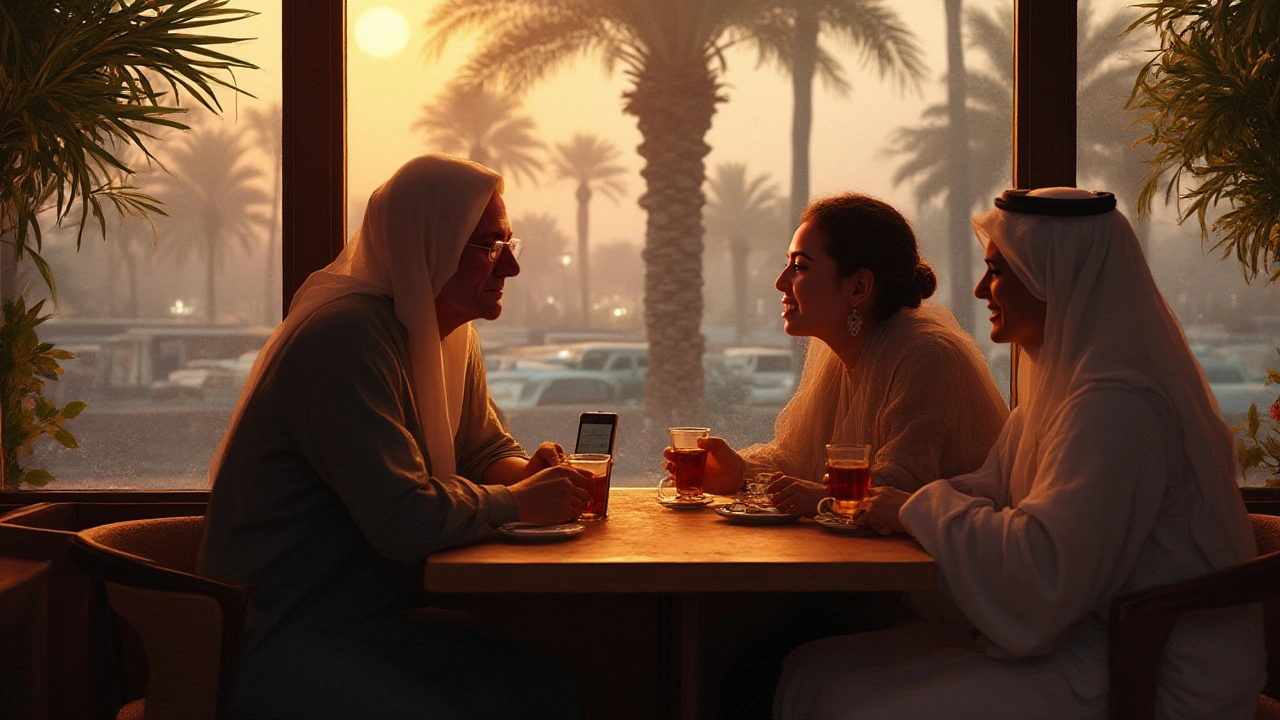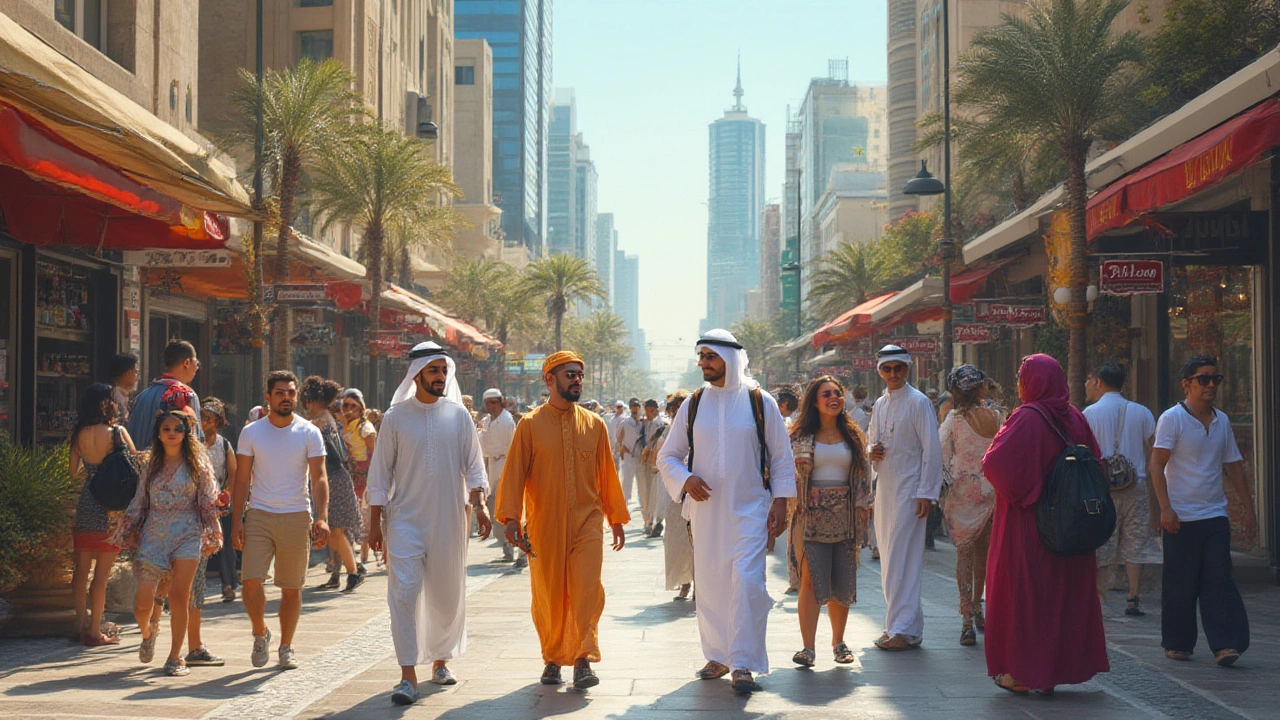You might think that stepping into Dubai means suddenly struggling with Arabic phrases or feeling lost in translation. Honestly, that’s a worry you can put to rest. Modern Dubai is like this language chameleon: signs in sleek shopping malls, train instructions, coffee shop menus, airport announcements—everywhere you turn, there’s English. Yet under the city’s dazzling glass-and-steel surface, things get much more interesting. People here don’t just use English for convenience. It’s how a melting pot of cultures makes sense of daily life. So, how far will English take you in Dubai, what’s the catch, and can you truly get by without knowing Arabic? Let’s break it all down.
The Lingua Franca of Dubai: How English Rules the City
So picture this: you land at Dubai International Airport, shuffle through customs, and—no surprise—the officer greets you with a crisp "Good morning." English is everywhere in this city. Why? Only about 15% of Dubai’s residents are Emirati nationals. The other 85%? Immigrants from India, Pakistan, the Philippines, the UK, the US, and dozens of other countries. It’s way more practical for everyone to chat in English. From office banter in glass towers to tradespeople fixing AC units, people rely on it almost by default.
Businesses hire staff from around the world, making a common language essential. The UAE government has recognized this since the huge economic boom started in the 1970s. As Dubai grew into a global hub, English became the thread holding it all together. Major schools use English as the main teaching language. Even public institutions offer documentation in both Arabic and English, and court cases involving expats are heard in English. You’ll rarely need a translator at banks, hotels, or hospitals.
English in Dubai isn’t just about survival. It’s about helping a city run smoothly, making everyone—from cab drivers to CEOs—feel at home. You’ll hear every accent under the sun, but it’s all English, and everyone’s fluent in the polite code-switching required to keep conversations flowing. The younger generation, especially, often prefers English chats, sometimes even at home.
But there’s a flip side. Step into the older neighborhoods—think Deira or Karama—and you’ll catch Tagalog, Urdu, or Malayalam in bustling street-side cafés. Still, English sneaks in everywhere: delivery apps, government websites, and even supermarket loudspeaker announcements.
| Language | Primary Use in Dubai | Example Contexts |
|---|---|---|
| English | Business, Education, Retail, Hospitality, Public Transport | Banks, Hospitals, Malls, Metro |
| Arabic | Government, Legal, Some Official Docs | Courts, National Events, Road Signs |
| Hindi/Urdu/Tagalog | Community, Everyday Interactions | Markets, Neighbourhoods, Private Chats |
English in Everyday Life: What You Can Expect
Here’s something funny: you’ll probably hear “please” and “thank you” more in Dubai supermarkets than back home. People in Dubai get creative with language, tossing in expressions picked up from their friends from Mumbai, Manila, or Manchester. Cashiers ask “Next please!” regardless of who’s at the register. “Madam,” "sir," and “please wait” echo in every queue, whether you’re buying dates at Carrefour or boarding a bus to Jumeirah.
Ordering coffee? Staff at Starbucks, Tim Hortons, or tiny corner cafés switch to crisp English as soon as they see your puzzled face. Need medical care? Doctors, nurses, and pharmacists in private clinics and most government hospitals speak English fluently, often with training abroad. If you wind up in legal trouble or need to deal with paperwork, you’ll discover English-speaking officials ready to help. Public transport—metro, taxi, bus—uses English signs and driver announcements, so you’ll never fret about getting lost.
English in Dubai doesn’t just mean perfectly spoken Queen’s English. There’s a whole informal dialect known as “Dubai English”—a mishmash of slang, phrases, and sometimes grammar that blends influences from across the globe. Statements like “Take left from the next signal,” or “I’ll drop you till Burjuman,” slide off the tongue of everyone from taxi drivers to investment bankers. It can sound odd at first, but you’ll quickly catch on.
Newspapers, radio stations, and even TV shows cater to English speakers. Popular radio hosts mix expat banter with local news, so you’ll stay in the loop even while stuck in Sheikh Zayed Road traffic. Need to brush up on your English? Language schools and conversation meet-ups fill up fast. Dubai is pretty big on welcoming people who want to improve, not just those already fluent.

Do You Need to Learn Arabic? The Honest Answer
Before you write off Arabic completely, let’s set the record straight. Officially, Arabic is the national language of the UAE. It’s the backbone for government communication, the legal system, and cultural traditions. Road signs, public notices, and key documents are bilingual—Arabic on top, English underneath. If you’re working in government, law enforcement, or public hospitals, a basic grip on Arabic helps a lot, and it's actually required for some positions.
But for nearly every expat job—from building skyscrapers to running a travel agency—fluent English takes you all the way. Even so, learning a few Arabic basics opens doors. A warm "Shukran" (thank you), "Salam Alaikum" (hello), or "La shukran" (no thanks) makes you stand out as respectful and earns smiles. Taxi drivers, security guards, and street vendors love it when expats try even a word or two. You’ll notice people go easier on you if you mix in a “Yalla” (let’s go) or “Habibi” (my friend), even if conversation continues in English.
Everyday English solves nearly every challenge: renting an apartment, opening a bank account, booking a doctor, or even dealing with the authorities. Still, if your aim is to really connect or take on long-term business projects, learning some Arabic shows respect for the culture. Some big Emirati-owned companies still expect a sprinkling of polite Arabic, especially at official dinners or business events. But don’t stress—almost everyone is used to switching gears. If you move outside Dubai, to more traditional UAE towns, you’ll hear fewer English speakers. But inside Dubai? English is your key.
Tips for Communicating Smoothly in Dubai
Getting your message across in Dubai might not be as simple as back home, but it’s rarely rocket science. Speak a bit slower. Remember, you could be talking to someone whose first language is Tagalog, Tamil, Russian, or German. Look people in the eye and smile—it goes a long way here. If someone seems confused, try rephrasing rather than raising your voice. In most shops or hotels, staff are trained to help you, even if you fumble a little. Don’t be shy to gesture or use your phone’s translation app in tougher spots.
The culture values politeness, so add a “please” or “thank you” even with simple requests. Many Filipinos, Indians, and Europeans in customer-facing roles have picked up casual British and American phrases, so don’t be surprised to hear "Cheers!" or "No worries!" out of the blue. If you’re staying long or doing business, memorize a few key Arabic words and watch how people warm to you.
If you’re worried about accent differences, relax. Dubai people are famous for their “ear”—they switch from British to American drawl to Indian lilt in a snap. Don’t stress about “proper” English; clarity beats grammar here. When in doubt about a word, ask for it to be written down or shown on a phone—staff are used to helping lost foreigners. Watching English-language local news is a plus for picking up useful terms you might not hear elsewhere. And if you pick up some of the unique Dubai-English blend words, you’ll fit in even faster.
- Keep communication short and clear.
- Use hand gestures if stuck.
- Smile—it really does help break the ice.
- Try a few “thank yous” and “pleases” in Arabic now and then.

Fun Facts, Common Surprises, and Language Pitfalls in Dubai
It’s easy to think Dubai is just an English island dropped in the Gulf, but there are plenty of quirky surprises. Walk down Sheikh Zayed Road at rush hour, and you’ll hear 150 different languages in a single block. Dubai is ranked in the top 10 most cosmopolitan cities worldwide, according to a 2024 UN demographic survey, and that exposes you to unique English expressions like nowhere else. “Timepass” for killing time or “no problem, madam!” repeated ten times in a single email—you’ll get used to it quickly.
While English works seamlessly in most places, pay attention at government offices. If you’re dealing with court documents, land titles, or police issues, you may have to sign bilingual paperwork. Always double-check English translations, especially before putting your name on contracts. Some medical paperwork is mostly in Arabic but comes with a small English summary. Airport officials and immigration staff switch effortlessly, but avoid slang when you need something important handled quickly. For legal and medical situations, ask for a certified English translator just in case.
Ever tried ordering food delivery? Apps like Talabat, Deliveroo, and Zomato run in English, and the staff handling your call are used to every possible accent. When buying electronics, groceries, or negotiating a rent deal, written English is the standard. You can try Arabic for fun, but prices and details are almost always explained in clear English. International schools teach all classes in English, and even children of expats graduate fluent enough to pass UK or US exams. But in social gatherings, it’s common to mix three or four languages in a single conversation—don’t be intimidated by what you overhear at parties or in cafés.
But here’s something few realize: Dubai’s use of English never erases local pride in Arabic. Emiratis swap between both languages without missing a beat. The government regularly runs campaigns and fun events to encourage residents and students to learn more Arabic and use it—think language festivals, Arabic book fairs, or social media drives. If you stick around long enough, you'll notice younger people switch between English and Arabic based on who’s in the room. It’s not about which language is better, but about being able to reach more hearts and minds in this whirlwind of cultures.
